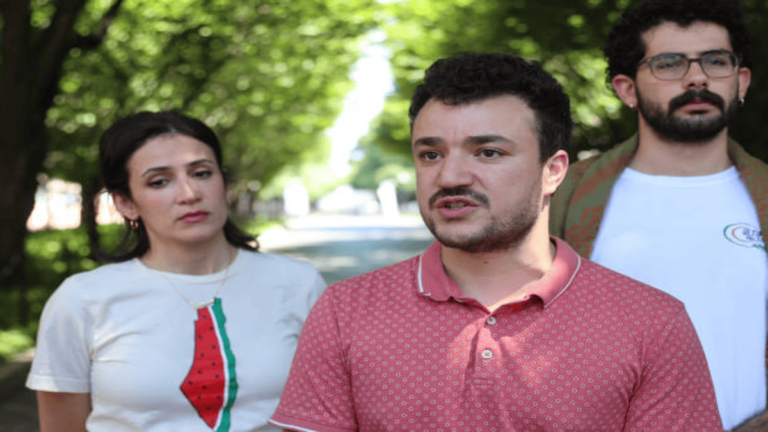
Tzvika Mor lead protesters from the Tsav 9, or Order 9, on a march towards the border crossing checkpoint with the goal of blocking aid shipments from getting into the Gaza, in Kerem Shalom, Israel in March, 2024. Marcus Yam/Los Angeles Times/Getty Images
Tel Aviv, Israel (EPICSTORIAN) – As the prospect of a ceasefire-hostage agreement between Israel and Hamas looms, a vocal minority of families with loved ones held captive in Gaza is strongly opposing the proposed terms.
The Tikva Forum, a group on the fringes of Israeli advocacy, has strongly opposed any agreement that involves releasing Palestinian prisoners in exchange for hostages, warning that such a move could threaten Israel’s long-term security, according to CNN.
Rooted largely in West Bank settler communities, the Tikva Forum’s stance contrasts sharply with the mainstream Forum advocating for the proposed ceasefire and release deal.
While most families are focused on securing immediate relief and the safe return of their loved ones, Tikva members argue that military action is the only viable solution to bring all hostages home.
Tzvika Mor, a co-founder of the Tikva Forum and father of Eitan, one of the hostages held by Hamas, has been vocal in his opposition.“This deal is very dangerous for my son and for most of the hostages,” Mor said.
He believes that partial releases jeopardize not only his son’s safety but also the broader principle of justice and security.
Boaz Miran, another member of the Tikva Forum, shares this sentiment. His brother, Omri, was abducted during the October 2023 Hamas-led attacks. Miran insists that all hostages must be returned simultaneously and rejects any prisoner release deal.
“We can’t agree to a situation where the released prisoners will murder our people in the future,” he stated firmly.
The proposed agreement, championed by the Israeli government, aims to secure the phased release of 33 hostages, focusing on women, children, and the elderly, in exchange for an undisclosed number of Palestinian prisoners, including individuals convicted of violent crimes.
While officials argue that the deal could ease the humanitarian crisis and create a path toward de-escalation, critics like Miran fear it sets a dangerous precedent. They worry it could leave some hostages behind and embolden Hamas or similar groups to continue their acts of violence.
Tikva Forum Against Mainstream Hostage Advocacy Groups
The divide between the Tikva Forum and mainstream hostage advocacy groups reveals the intense emotional and ideological struggles shaping the negotiations. For the Tikva Forum, the compromise is seen as a betrayal of Israel’s security and justice, while the majority of families view it as a pragmatic step toward reuniting loved ones.
Also Read: Israeli Forces Confiscate Over 3,300 Weapons in Strategic Israel-Syrian Border Operation
As talks progress, the Israeli government faces a delicate balancing act—addressing security concerns while responding to the needs of hostage families.
Whether the fragile ceasefire agreement can withstand these pressures remains uncertain, but for families like those of Mor and Miran, the stakes are painfully personal and deeply urgent.







